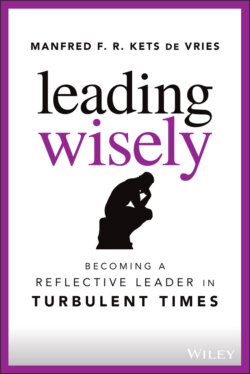Читать книгу Leading Wisely - Manfred F. R. Kets de Vries - Страница 14
Acquiring night vision
ОглавлениеAs I am suggesting, many very knowledgeable and highly intelligent people lack wisdom. Clearly, to acquire knowledge as opposed to wisdom requires very different methods of exploration. Of course, you can study many books to attain greater knowledge, but to study books to attain wisdom will be much more of a challenge. As the German-Swiss novelist Hermann Hesse explains, ‘Knowledge can be communicated, but not wisdom. One can find it, live it, be fortified by it, do wonders through it, but one cannot communicate and teach it.’ To acquire wisdom, you must be willing to observe, experience and act, using the best of your judgement. That is the reason any effort to obtain a modicum of wisdom necessitates a very different curriculum, as the story of the king and the painting illustrates. To read books, helpful as such an activity may be, would not be sufficient.
Wisdom also implies acquiring a degree of ‘night vision’, meaning having the ability to see what is not so obvious and not to be fooled by superficialities. Many people imagine that they see. In truth, however, they do not really observe. As a result, they do not understand. Generally speaking, people do not see beyond the surface of things; they are used to judging a book by its cover. However, while doing so, they do not see what is happening beneath the surface. What I am trying to say is that wisdom is not increased by acquiring more information, but rather by increasing the capacity of your seeing.
Sadly enough, many people do not understand the root causes of behaviors and actions. They remain blind to the fascinating world of unconscious phenomena. They do not know how to decipher the subliminal signs. However, there are ways to go about it. In the Preface of this book, I have already mentioned the psychodynamic-systemic lens that I use to add another dimension to the understanding of complex phenomena – in being able to observe things better. For the wisdom equation, such a lens may be a sine qua non.
Clearly, to acquire wisdom, you need to be able to see not only what is on the surface, but also what is beneath it. Unfortunately, as I have mentioned before, most people only see the obvious. Of course, they may have become quite knowledgeable about various subjects by reading, researching and memorizing facts. They may even be able to spout knowledge. Being able to do so makes them seem intelligent. It makes them look clever. However, what should be kept in mind is that people who have all the answers are not necessarily wise. In spite of being perceived as knowledgeable, they may be totally blind to many things. In contrast, wise people are less certain about what is going on in their lives. They may have their doubts in trying to make sense of what is happening around them. As the Persian poet Jalāl ad-Dīn Muhammad Rūmī said, ‘Sell your cleverness and buy bewilderment.’ They very much realize that there is so much that they do not know. There are so many mysteries that need to be deciphered, but it is exactly this particular state of mind that makes them curious to want to learn more. Therefore, it should not come as a surprise that in their wanderings through life, they keep on registering a sense of wonder and bewilderment.
Sometimes, I wonder whether our wisdom tends to grow in proportion to our awareness of our ignorance. After all, like Socrates, only when we realize that we know so very little will we continue to be searching for greater knowledge. It is exactly the acknowledgement of our ignorance – of all these unknowns – that might motivate us to search for more. In reflecting on this search for more, a Zen story about a Zen master and a prospective student comes to my mind:
A visitor went to see a Zen master to request him to impart spiritual knowledge to help him to become wise. The Zen master asked him to sit down to have a cup of tea. After he had placed the cup in front of the visitor, he started to pour. Quickly the cup filled up, but the Zen master didn't stop. He kept on pouring, causing the tea to spill out.
Seeing what was happening, the visitor became increasingly agitated, to finally cry out: ‘Please stop, the cup is full. Don't you see that the tea is running out of the cup?’
The Zen master replied, ‘Why don't you look at the cup as a metaphor of your mind. The way you spoke to me, it seems like your cup is already completely full. But how, when you think that you already know everything, can you become receptive to new knowledge? How could I ever help you to become wise?’
As this Zen story suggests, wisdom does not come to people who believe that they have nothing more to learn. After all, you cannot really explore the universe if you think that you are the center of it. If you desire to grow and develop, you should have a never-ending need for a greater understanding of what is happening around you. In particular, if you are looking for wisdom, it is important to always remain curious. You should never let go of this compelling need to find out more about all the unknowns.
